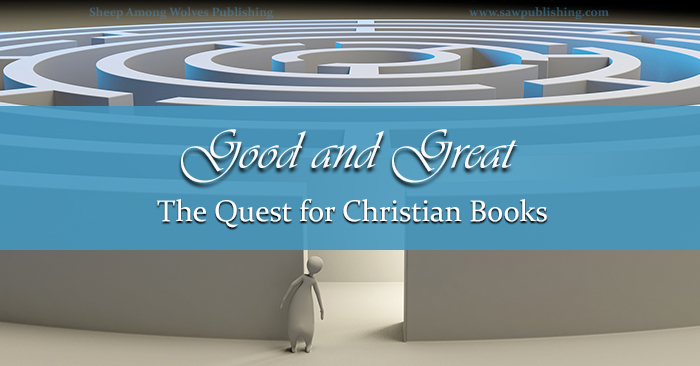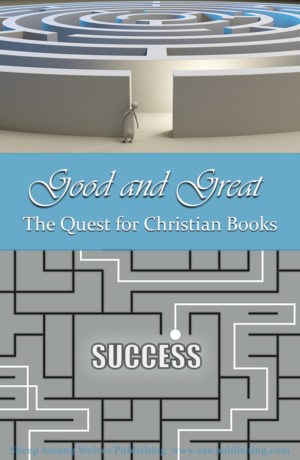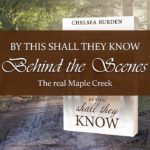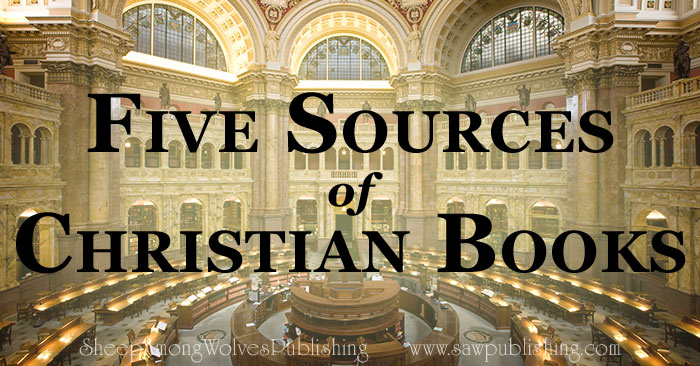Good and Great: The Quest for Christian Books
 They’re the un-google-able search term—not because nobody’s got them, but because there are just too many. “Christian books.” Go try it, yourself. You’ll get Christian publishers. You’ll get Christian bookstores. You’ll get the top 25 books every Christian should read. (Yikes! I haven’t read any of them!!!)
They’re the un-google-able search term—not because nobody’s got them, but because there are just too many. “Christian books.” Go try it, yourself. You’ll get Christian publishers. You’ll get Christian bookstores. You’ll get the top 25 books every Christian should read. (Yikes! I haven’t read any of them!!!)
The market is flooded and yet the demand never wanes. But in a world that’s just so big, it can be easy to end up feeling lost, overwhelmed, discouraged, or even disillusioned in your search for healthy literature. The quest for Christian books isn’t always an easy one. That’s why it can always be encouraging to hear that you’re not alone!
Here are three common myths about Christian literature—and three personal stories about the books that overthrew those myths in my own life.
 Myth One: Christian Books are Rare
Myth One: Christian Books are Rare
According to that infallible authority THE INTERNET, somewhere between 63% and 65% of Americans identify as Christian. Notwithstanding this fact, I think it would be fair to say that the majority of active Christians perceive themselves as a social minority. This can’t help having an impact on the way we view Christian books.
Are Christian books—particularly strongly Christian fiction—something rare?
There are two sets of books that contributed to the overthrow of this myth for me. The first was Sarah Maxwell’s Moody Series, which came out during the late 2000s/2010s. Those of you who were homeschoolers/homeschooled students at the time will remember the huge emotional boost those books were for a lot of us. The Moodys family-focused, Christian life, “just like ours,” did something special to validate spiritually-intentional Christian books for a whole new generation of writers. Maybe Christian fiction was still rare—but we could no longer say it didn’t exist.
And the second category of books that challenged the “Christian books are rare” myth was the books that next generation wrote, and are still writing, today. For me, personally, that generation of writers is represented by the King’s Daughters Writing Camp. If you’ve never been on their website, check it out today! (And yes, in the interests of full disclosure, I am both a camp member and an “auntie” with KDWC—so my advice is totally and delightfully biased!)
Myth Two: Christian Books Aren’t Well-Written
I think the first books that contradicted this myth for me were probably Lamplighter Publishing’s reprints. I absolutely LOVE their emphasis on quality—from their beautiful spare-no-expense paper and binding right through to the stories themselves.
Vivid language—great vocabulary—and amazing historical accuracy all contribute to this champion voice of well-written Christian books. I discovered Lamplighter in my early teens, and they had an unquestionably strong influence on the way I have viewed Christian literature ever since.
Myth Three: Christian Fiction Doesn’t Really Matter
This is the myth that gets the strongest emotional reaction from me! I can’t even read that heading, without getting a surge of indignation. As most of you know, its impossible to read the Sheep Among Wolves blog for very long without knowing I believe passionately that Christian fiction matters.
And the author who shaped my opinion on this—as well as a whole lot of other aspects of Christianity—is Charlotte M. Yonge. I fell in love with her writing as a teenager. It changed my own life, and it revolutionized the way I look at Christian literature. Her writing can be a bit heavy for a first-time reader, but it is some of the deepest, most spiritually-challenging literature you’ll ever read! Even if I’d never read another Christian novel, Charlotte Yonge’s writing would convince me that Christian fiction makes a difference for eternity!
(End of Eulogy—and my apologies to those of my friends who have heard it before!)
Good and Great Books are Out There!
If you are growing weary in your search for Christian books—if you are feeling disappointed, discouraged, disillusioned, maybe even wondering if healthy literature exists at all—I want to encourage you today that Christian books matter. And they do exist!
Keep on persevering! It’s going to be worth the effort.
I’d love to hear some of the titles and authors that have helped to debunk your greatest myths about Christian books, too. Just drop a comment in the section below.
Looking for more detail on where to find Christian literature? See our previous post:
You might also enjoy:

Do you believe in good and great books? Not everyone hears this question the same way. What do you actually mean if you say yes?

Do you ever wonder what goes on before the first words of the first draft of a novel are even penned? Today I’d like to take you behind the scenes of By This Shall They Know—at the journey to Maple Creek.

Do you like hearing the true incidents behind a fictional story? Do you wonder how much an author’s own experience affects the stories she writes? Come behind the scenes of By This Shall They Know, and see how much the Real Maple Creek influenced this soon-to-be-released novel!

